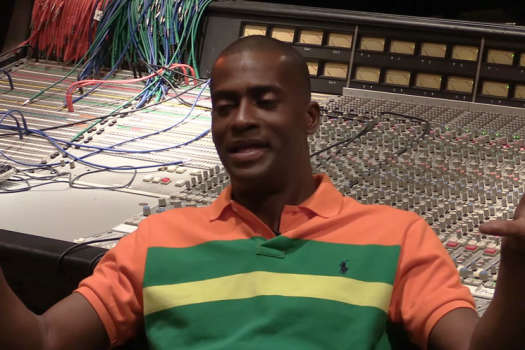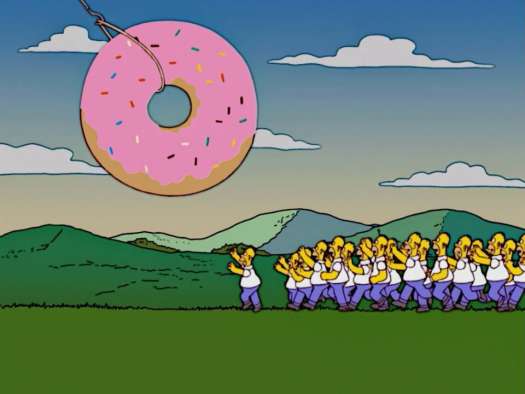Count Matthew Herbert among the lucky ones. Over the last decade, the British producer has survived the "here today, gone tomorrow anonymity of electronic dance music. Hes distinguished himself as a personality to be reckoned with, equally comfortable on dance floors and among the chin-scratching crowd. Hes freewheeled between house, techno, electro, ambient, and even big band under a cavalcade of monikers like Doctor Rockit, Radio Boy, and Wishmountain. Even he admits that his restlessness can make him "a bit of a pain in the ass to follow.
"My music often comes out under different names or different labels. Im independent, so its not like you can walk into any shop and buy it. You pick up one record and it might be more techno, then the next one is more big band. Its not an easy path to try and keep current with.
And yet, these days, Matthew Herbert can stand shoulder to shoulder with the likes of Richie Hawtin and Richard D. James. His back catalogue belies an experimentalist with a deft populist touch, a producer who can change monikers like shoes and still maintain a sizeable fan-base, a near-peerless reputation, and the proven vision to do just about anything he wants.
In a nutshell, Herbert is a conceptualist who sees the world in rhythms and patterns worth dancing to. And his latest album, Scale, a passionate micro-funk diatribe against modern alienation, counts among his greatest achievements to date.
"With this record, I very much wanted to hold up a mirror to my own life and show its inconsistencies, its problems, and yet celebrate the good stuff as well. I wanted to create a mirror of how I see the world at the moment, as this glamorised, plasticised, glossy, secure, comforting utopia of possibilities. Thats part of what were told, and part of how it actually is.
"And yet, at the same time, its underpinned by this very dim violence and pollution. Our air is perfectly clean, but in China, where all our stuff is made, the airs polluted. We might go to our local bakers and see this amazing array of organic loaves, and yet almost all the flour in Britain comes from Canada. Its transported across oceans and we have no idea how the grain is raised. So, I wanted to show that privileged world that I inhabit.
The ingenuity of Scale, which is by far the most dance-friendly album Herbert has produced since 1998s Around the House, is the way he manages to draw his staunch political theories into such a funky record.
"I didnt make any of the [sample] recordings myself, he explains. "I made a list of everything I wanted, and my assistant went off and made them. I wanted to draw peoples attention to the fact that we dont make anything from the things around us anymore. I wanted to see what it was like to make a piece of music where I had no idea what it was made from, where I had no idea who contributed to it.
Scale puts these samples to subversive use, tailoring them to the disco-fied excesses of our first-world party culture. By tempting us to dance to a soundtrack of our own ignorance, Herbert has feted us with one of the most damning cultural statements made by any musician in a long time.
And yet, theory aside, Scale still stands as a first-rate house album. "Theres a strong documentary thread to what I do, he admits, "but it has to work as music. Ive always felt that Ive tried to seduce people into listening to different sounds and noises. With this record, I wanted to wear a shorter skirt, to have a glass of champagne to one side and maybe some make-up. Consider us seduced.
"My music often comes out under different names or different labels. Im independent, so its not like you can walk into any shop and buy it. You pick up one record and it might be more techno, then the next one is more big band. Its not an easy path to try and keep current with.
And yet, these days, Matthew Herbert can stand shoulder to shoulder with the likes of Richie Hawtin and Richard D. James. His back catalogue belies an experimentalist with a deft populist touch, a producer who can change monikers like shoes and still maintain a sizeable fan-base, a near-peerless reputation, and the proven vision to do just about anything he wants.
In a nutshell, Herbert is a conceptualist who sees the world in rhythms and patterns worth dancing to. And his latest album, Scale, a passionate micro-funk diatribe against modern alienation, counts among his greatest achievements to date.
"With this record, I very much wanted to hold up a mirror to my own life and show its inconsistencies, its problems, and yet celebrate the good stuff as well. I wanted to create a mirror of how I see the world at the moment, as this glamorised, plasticised, glossy, secure, comforting utopia of possibilities. Thats part of what were told, and part of how it actually is.
"And yet, at the same time, its underpinned by this very dim violence and pollution. Our air is perfectly clean, but in China, where all our stuff is made, the airs polluted. We might go to our local bakers and see this amazing array of organic loaves, and yet almost all the flour in Britain comes from Canada. Its transported across oceans and we have no idea how the grain is raised. So, I wanted to show that privileged world that I inhabit.
The ingenuity of Scale, which is by far the most dance-friendly album Herbert has produced since 1998s Around the House, is the way he manages to draw his staunch political theories into such a funky record.
"I didnt make any of the [sample] recordings myself, he explains. "I made a list of everything I wanted, and my assistant went off and made them. I wanted to draw peoples attention to the fact that we dont make anything from the things around us anymore. I wanted to see what it was like to make a piece of music where I had no idea what it was made from, where I had no idea who contributed to it.
Scale puts these samples to subversive use, tailoring them to the disco-fied excesses of our first-world party culture. By tempting us to dance to a soundtrack of our own ignorance, Herbert has feted us with one of the most damning cultural statements made by any musician in a long time.
And yet, theory aside, Scale still stands as a first-rate house album. "Theres a strong documentary thread to what I do, he admits, "but it has to work as music. Ive always felt that Ive tried to seduce people into listening to different sounds and noises. With this record, I wanted to wear a shorter skirt, to have a glass of champagne to one side and maybe some make-up. Consider us seduced.




